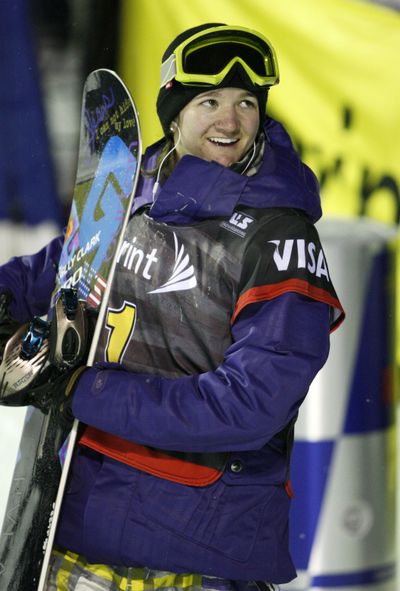Clark is woman to beat in halfpipe

PARK CITY, Utah – She went for it.
One fewer spin four years ago in Italy, and Kelly Clark probably wouldn’t have fallen, meaning there would be two Olympic gold medals hanging at her family’s restaurant in Vermont today instead of only one.
Going for it, though, has always been the way America’s best female halfpipe rider does it. So, with a chance to win back-to-back gold medals on her final Olympic run in Bardonecchia, Clark didn’t really see it as a choice.
“I’ve never been one to make decisions in a contest based on my circumstances,” she said. “I knew what I was going to do regardless of what the scoreboard said.”
The scoreboard said she was behind Hannah Teter, Gretchen Bleiler and Kjersti Buaas, that a 720-degree spin at the bottom – the kind of spin Clark can land in her sleep – would put her on the medal stand, maybe on top of it.
Clark, however, can spin 900 degrees – that was the game plan. She stuck with it and fell – and finished fourth.
“If I’d done the 7,” she said, “I might have won that medal, but I wouldn’t have been happier later in life.”
Four years later, Clark’s fourth-place finish is a distant memory. She is back where she was before Turin – the best in the world, and the woman to beat at the Vancouver Games.
She won four of five U.S. Grand Prix events this winter to easily make the U.S. Olympic team.
That the 26-year-old Clark has remained atop of this sport for a good portion of the last eight years is a testament to her athleticism and work ethic. Especially of late, skills on the halfpipe are evolving over the span of weeks and months, not years, and the recent expansion of the pipe from 18 to 22 feet has washed out some of the women’s tricks, made them look less-than-spectacular.
But not Clark’s. Watching her drop into the pipe and soar above it, 10-15 feet in the air, it’s clear she has kept up with the times, if not defined them.
“I think it’s beneficial to everyone,” Clark said of the growing halfpipe. “It enables you to have more time to build up speed and ramp up your tricks.”
That frontside 900, she promises, will definitely be in the repertoire on Feb. 18 at the Cypress ski area outside Vancouver. There will be no watering down, no matter what the scoreboard says.
“One reason I know that’s the right thing is because back in 2002, I was in the exact same situation,” she said of her winning day in Park City. “I was in second place, the last competitor to go and I knew I had to go for it.”
She did, and won the gold.
Did it again four years later and came up short.
“It’s just my style, who I am,” she said. “Looking back, I don’t regret it at all.”